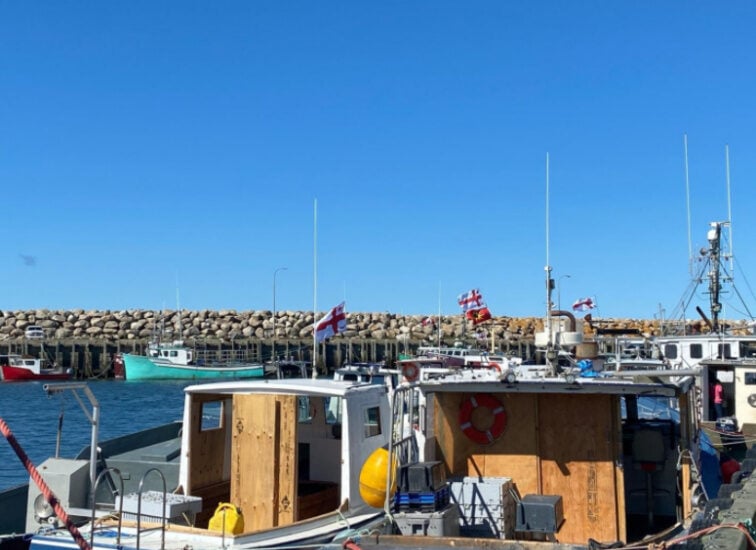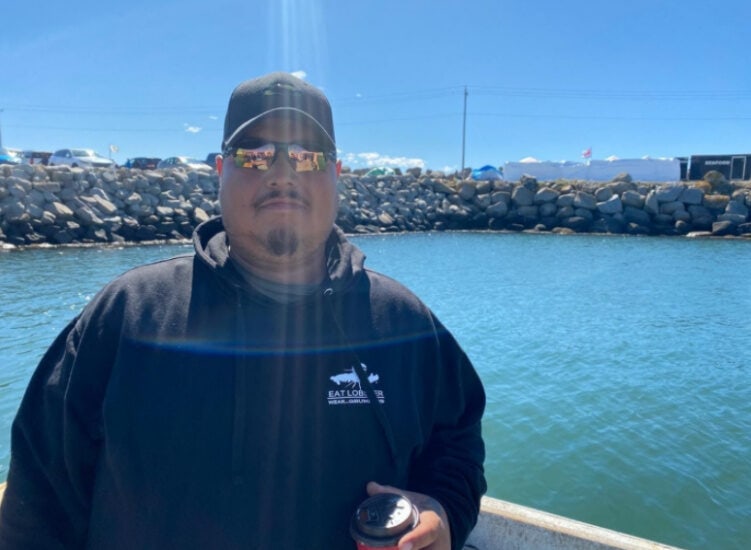
Taqmetek (Saulnierville) – Despite confrontation from non-native commercial fishermen, Mi’kmaq fishers remain at the Saulnierville wharf as they continue to exercise their right to fish and harvest under a moderate livelihood.
The tensions between Mi’kmaq and non-native fishermen has been an on-going point of political unrest in Nova Scotia for over 20 years.
The treaty rights dating back to 1752 also known as the Peace and Friendship Treaties, signed between indigenous and settler people, which promised hunting, fishing and trading rights for the Mi’kmaq and ultimately allowing Mi’kmaq to operate under a moderate livelihood.
This treaty right was reaffirmed in 1999 under the Marshall case by the Supreme court of Canada.
Monday, Mi’kmaq fisherman docked on the Saulnierville Wharf situated on the St. Mary’s Bay, continued to prepare to lay more traps, after having their lobster traps cut by non-native fisherman on Sunday. Non-native commercial fishermen are claiming the Mi’kmaq are illegally fishing out-of-season, but the Mi’kmaq are in fact fishing under a moderate livelihood which is separate from commercial fishery seasons.

Robert Sack of Sipekne’katik First Nation has been fishing for over 20 years and believes reconciliation has yet to be reciprocated by the settler legal systems and people. “We did our reconciliation back in 1752, all those treaties we’ve signed, that was our reconciliation there, we held up our end of the deal, but we haven’t seen nothing good come from it.”
Sack and other Mi’kmaq fishermen have been subjected to harassment, racial slurs, theft and even property damage at the guise of non-native protesters who don’t agree with the moderate livelihood fishing season. “I just don’t get it, it’s terrorism, it is terrorism on land, on water, on parliament, the law, everything” said Sack.
Kate Kristoffel, who came down from Halifax to show her support, has a keen interest in promoting peaceful dialogue. She believes advocates and settler allies need to help create that space. “I think people just need to feel heard and I don’t think either side is feeling heard right now.”
Kristoffel explains her concern for the fishermen out on the water, “it really is heartbreaking to see them experience racism like that,” and hopes to see safe spaces for dialogue occur sooner rather than later.

Levi Paul, a Mi’kmaq fisherman who is also operating under a moderate livelihood license, firmly believes he needs to push through the chaos in order to preserve and protect his treaty rights. “This is our children’s future; this is why we do this. This is why we have been here for 21 years. If we don’t stand up and protect our treaty rights now, who is going to do it down the road?”
The premier of Nova Scotia addressed the province in a media release Monday, stating “The province recognizes and supports the legal, constitutional Aboriginal and treaty rights of the Mi’kmaq, and while many of the details surrounding the nature and the extent of those rights are not clear, clarification is best addressed through open and respectful dialogue.”
The assembly of Mi’kmaq Chiefs in a statement released Monday want productive dialogue to take place and treaty rights legally respected, “The Chiefs also want to make clear to the Ministers and in turn, the public, that despite what is being incorrectly communicated in mainstream media, moderate livelihood is not an illegal fishery.”
Robert Sack and Levi Paul have been fishing for 21 years and won’t be slowing down anytime soon. “Right now, we want to be recognized, we want to be able to sell our fish at a decent price,” said Sack. Levi wants to see positive resolutions made without violent confrontations taking place against his fellow fishermen and boats, “It’s really sad that they’re doing this to us.”
Amber Bernard is a Mi’kmaw journalist and researcher. Follow her on Twitter.
See also: After 21 years of government inaction Mi’kmaq assert their right to fish
With a special thanks to our generous donors who make publication of the Nova Scotia Advocate possible.
Subscribe to the Nova Scotia Advocate weekly digest and never miss an article again. It’s free!



